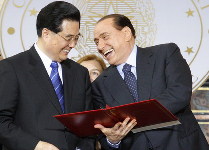
Italy's Prime Minister Silvio Berlusconi (R) holds a document on economic and cultural exchanges with China's President Hu Jintao during a press conference in Rome July 6, 2009. [Agencies]
ROME: Leaders of the Group of Eight will push for common positions on promoting democracy in Iran, combatting climate change and coordinating their exits from huge government stimulus measures?-- even amid a growing sense that the group's pre-eminence may be fading.
Prime Minister Silvio Berlusconi, the host, boasts that 90 percent of the world economy will be represented by 39 nations at the G-8's annual three-day summit, which was moved from sun-drenched Sardinia to quake-stricken L'Aquila to boost the local economy and reconstruction efforts.
|
|
But only the main eight -- Britain, Canada, France, Germany, Italy, Japan, Russia and the United States -- enjoy status as full agenda-setting participants. The others -- including the world's five largest emerging economies, who meet separately on the first day Wednesday, and nine African nations -- join the main forum later mostly on topics already covered by the core eight.
Despite its political and economic clout, there is an increasing acknowledgement, even among some of its leaders, that the G-8 is too narrow for big political and economic decision-making. China, a major exporter and holder of vast foreign currency reserves, needs to be on board in combatting the global economic crisis, and along with India and Brazil remains an indispensable partner on climate change.
"We see that the world is growing together. The problems that we face can no longer be solved by the industrialized nations," German Chancellor Angela Merkel said in a pre-G-8 speech last week.
Leaders will look ahead to a Group of 20 summit including developing countries September 24-25 in Pittsburgh as they continue to coordinate efforts begun at an April 2 G-20 in London to counter the world economic crisis.
European members led by Germany have stressed the need to limit the government spending and monetary expansion resulting from efforts to stimulate national economies, fearing crippling debt and inflation. The US and Britain meanwhile are still emphasising the need for stimulus, stressing it is too early for "exit strategies."
When the leaders discuss Iran and the regime's violent crackdown on opposition protests it won't be to impose new sanctions for its nuclear program. That power belongs to the UN Security Council. Any action is likely to be limited to condemnation, and the discussion to center on finding and striking the right tone.
But the leaders are expected to focus on how to balance diplomacy with tougher action, and perhaps whether nations like Germany and Italy, which have significant economic ties to Iran, would be willing to back sanctions over Iran's nuclear program.
"I don't expect any open fights on this, but I expect intense debate and think all are more or less convinced there has to be a new round (of sanctions) and that they have to build up pressure on Iran. Iran has shown who the regime is," said Iran expert Anthony Seaboyer at the German Council on Foreign Affairs in Berlin.
President Barack Obama arrives after meetings in Moscow with President Dmitry Medvedev, where experts hope the two nations will make progress toward a common voice on Iran. Russia has been reluctant to criticize the Iranian leadership.
They will also seek a coordinated position on climate change, including such issues as promoting new technology and cleaner energy and goals on emissions and limiting temperature increases. On the second day, the summit adds five developing countries -- Brazil, China, India, Mexico and South Africa -- plus special invitee Egypt, focusing on getting developing nations on board.
The summit opens to African nations on the last day, with food security topping the agenda. Italy, home to both the UN's Food and Agriculture Organization and World Food Program, is pushing for a package that could include a move toward strategic grain reserves and calls for investments in new agriculture technologies.
The effort comes as Italy, along with France, have taken heat for donating only a fraction of $8 billion in aid they pledged to increase aid to sub-Saharan Africa by $25 billion a year by 2010 as part of ambitious plans laid out by the G-8 in 2005. Italy's current spending only covers 3 percent of the $3.5 billion it promised and France has delivered only 7 percent of the additional $5.2 billion it pledged, according to the London-based anti-poverty group ONE.
Still, a G-8 monitoring group says that three-quarters of the 296 commitments made at the last summit in Japan have been kept -- about average for the G-8, and no worse, perhaps better, than promises kept by many elected leaders to their constituents.
"These summits are worth doing. Promises made are promises kept, three-quarters of the time," said John Kirton, director of the G-8 Research Group at the University of Toronto.